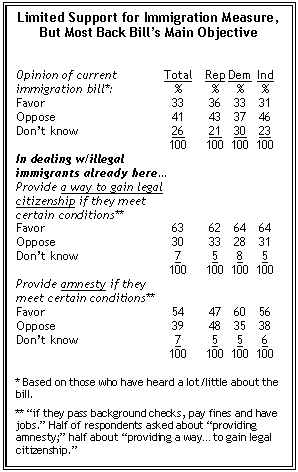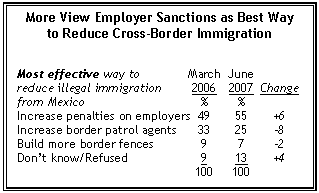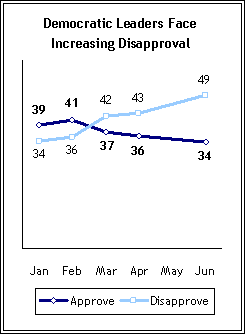
The public is ambivalent about the immigration bill being debated by the Senate. Most Americans favor one of its key objectives, but the bill itself draws a mostly negative reaction from those who have heard about it. Just a third of those who have heard something about the bill favor it, while 41% are opposed, and a relatively large minority (26%) offers no opinion.
Yet one of the bill’s primary goals – to provide a way for people who are in this country illegally to gain legal citizenship under certain conditions – wins broad and bipartisan support. Overall, 63% of the public – and nearly identical numbers of Republicans, Democrats and independents – favor such an approach if illegal immigrants “pass background checks, pay fines and have jobs.”
The debate over immigration has focused in part on whether the bill currently before Congress amounts to a grant of amnesty for people who are in the U.S. illegally. In general, the public is less supportive of providing “amnesty” for illegal immigrants than it is of providing a way for illegal immigrants to gain citizenship. Even so, a majority of Americans (54%) say they favor amnesty for illegal immigrants already in the country if they pass background checks and meet other conditions.
The way in which the issue is characterized has a significant effect on Republican views. While 62% of Republicans favor “providing a way for illegal immigrants currently in the country to gain legal citizenship,” support declines sharply when the concept of amnesty is raised. However, even when the policy is described as “providing amnesty” for illegal immigrants, about as many Republicans favor (47%) as oppose (48%) the idea.

The latest national survey by the Pew Research Center for the People & the Press, conducted May 30-June 3 among 1,503 adults, finds a growing majority of Americans saying increased employer sanctions, as opposed to more border fences and patrols, can best reduce illegal immigration from Mexico. A 55% majority sees increased penalties on employers who hire illegal immigrants as the most effective way to stem cross-border immigration, up from 49% a year ago. By comparison, just 25% say increasing the number of border patrol agents is the best solution, and even fewer (7%) see more border fences as the most effective solution.

The survey finds that Americans are less impressed now by the Democratic congressional leadership than when the party took control of Congress in January. While approval of the job Democratic leaders are doing has dipped only slightly – from 39% in January to 34% today – disapproval has grown substantially from 34% to 49%. Independents, in particular, express a much more negative opinion of Democratic congressional leaders. Fully 58% disapprove of their job performance, up from 40% in January.
Among Democrats, disapproval of Democratic leaders has approximately doubled since January (from 13% to 27%). Still, a solid majority of Democrats (58%) approve of the job the party’s congressional leaders are doing.
Democratic leaders in Congress also are facing criticism from both the right and the left for their handling of Iraq policy. Liberal Democrats are increasingly of the view that Democratic congressional leaders have not gone far enough in challenging President Bush’s Iraq policies, while most Republicans say they have gone too far in confronting the president over Iraq.
More generally, the proportion of Americans who favor removing troops from Iraq as soon as possible continues to increase. Overall, 56% favor a troop withdrawal as soon as possible – the most ever in a Pew Research Center survey – while 39% say the U.S. should keep troops in Iraq until the situation has stabilized. In addition, public optimism about U.S. efforts to train Iraqi security forces so they can replace U.S. troops has slipped significantly – 42% believe the U.S. is making progress in this area while 36% believe it is losing ground. This has been an aspect of the Iraq effort where majorities felt that progress was being made.




